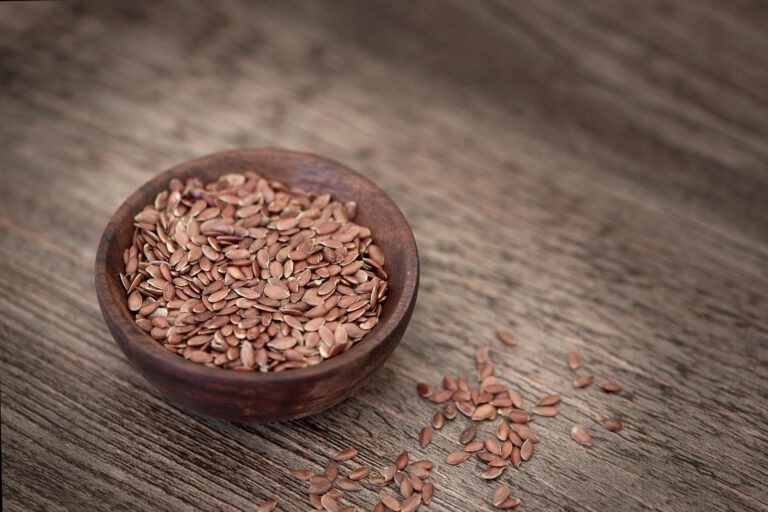Flaxseed – why it is healthy and when it is worth eating
Contents
Flaxseeds are the seeds of the common flax plant. These inconspicuous, tiny, brown-gold grains are classified as superfoods—that is, as unprocessed, natural foods whose nutritional richness has a positive effect on human health. It's good to know when it's worth reaching for flaxseeds, and how and in what form they should be consumed, because consuming this readily available product has a very beneficial effect on our bodies.
Nutritional properties of flaxseed
Consuming 1-2 tablespoons of flaxseed daily is a complete dietary supplement. Its health-promoting effects are based on its high content of biologically active ingredients that support the body in maintaining its health. Flaxseed contains, among other things:
- Vitamins C, E, K, niacin (vitamin B3) and other B vitamins (B1, B2, B5, B6), including folic acid,
- Minerals such as: potassium, magnesium , calcium, copper, manganese, zinc and selenium,
- Amino acids: Leucine, Lysine, Phenylalanine, Tryptophan,
- Lignans – have a protective effect on the liver,
- Lignin SDG – has a positive effect on women’s hormonal balance and also supports bone mass growth.
- Omega-3 fatty acids – flaxseed is one of the richest plant sources of these acids,
- Mucilages – they become visible after adding water to whole or ground grains and give the mixture a characteristic, viscous consistency – plant mucilages have a positive effect on the digestive system,
- Fiber , including water-soluble fiber – has a positive effect on the bacterial flora of the intestine,
- Plant sterols – compounds that protect the body from free radicals.
Use of flaxseed
The use of flaxseed is recommended for:
- Stomach ulcers – regular consumption protects the mucous membrane, relieves discomfort and relieves pain,
- Reflux – Flaxseed protects the mucous membrane, relieves discomfort and burning in the esophagus,
- Diarrhea and flatulence – water-soluble fiber in flax seeds helps to restore the correct composition of the microflora,
- Constipation – Flaxseed regulates the work of the digestive system and also relieves discomfort in people with irritable bowel syndrome.
- Slowing the development of type II diabetes – Lignans reduce the risk of developing diabetes because they lower blood sugar levels in type II diabetes and fiber reduces sudden fluctuations in glucose concentration.
- Sore throat and cough – thanks to the protective effect of flaxseed and the moistening of the throat, the symptoms of sore throat are relieved,
- Reduction diet – a healthy diet enriched with flaxseed is recommended for the prevention of obesity, as the addition of flaxseed to a meal causes a faster feeling of satiety and reduces appetite.
- Hormonal problems – Flaxseed lignans reduce the symptoms associated with high or low estrogen levels in the body. Flaxseed is recommended for women going through menopause.
- High blood pressure – Alpha-linolenic acids reduce the tension of the blood vessel walls,
- Prevention of osteoporosis – lignans contained in flax seeds inhibit the development of osteoporosis,
- Lowering bad cholesterol – consuming flaxseeds provides alpha-linolenic acid, which helps lower the concentration of triglycerides, leading to a reduction in the risk of thrombosis, atherosclerosis, and other diseases of the cardiovascular system.
How to use flaxseed
Flaxseed can be consumed in a variety of ways. If possible, you can first grind the seeds in a coffee grinder or buy pre-ground flaxseed and pour hot water over them. The result is a jelly-like drink that supports digestive function, soothes sore throats, and provides a feeling of fullness. It's also a good source of omega-3 fatty acids, which is why it's recommended for pregnant women. Flaxseed can be added to fruit and vegetable smoothies with cereal or flaxseed powder. It's a great addition to salads and soups, and a topping for sandwiches.
Including flaxseed in your daily diet brings numerous health benefits. A serving of two teaspoons a day is enough to provide the body with many valuable nutrients. It should be noted that excessive consumption of flaxseed can contribute to dehydration, so be sure to drink plenty of fluids while consuming it.
THE PUBLISHER'S CHOICE
Dried plums 1 kg BIOGO
- €7,01
- €7,01
- Unit price
- / per
Dried White Mulberries 500 g ORGANIC
- €5,84
- €5,84
- Unit price
- / per
Almonds 1 kg BIOGO
- €11,69
- €11,69
- Unit price
- / per
Cranberries sweetened with apple juice organic 1 kg BIOGO
- €16,37
- €16,37
- Unit price
- / per
Dried dates 1 kg BIOGO
- €4,21
- €4,21
- Unit price
- / per
Unpeeled buckwheat groats 1 kg BIOGO
- €2,81
- €2,81
- Unit price
- / per
Walnuts 800 g BIOGO
- €8,65
- €8,65
- Unit price
- / per
Peeled sunflower seeds 1 kg BIOGO
- €3,04
- €3,04
- Unit price
- / per
PULLED ORGANIC SUNFLOWER SEEDS 1 KG BIOGO
- €4,44
- €4,44
- Unit price
- / per












































































































































